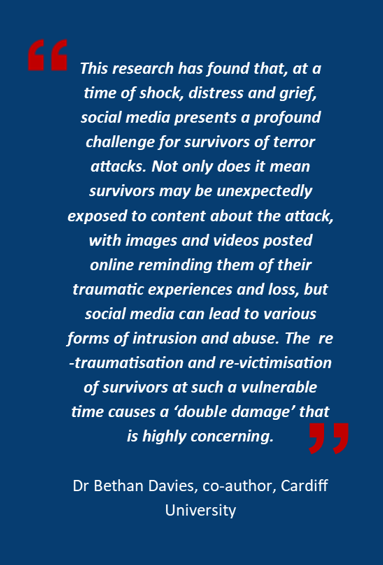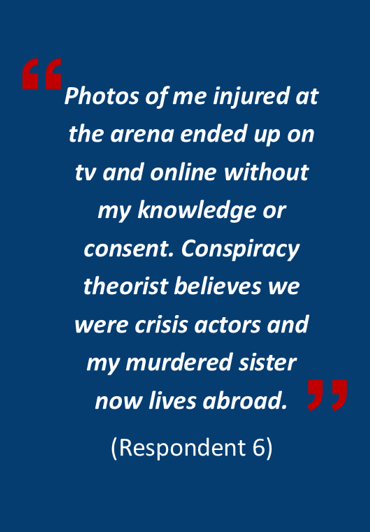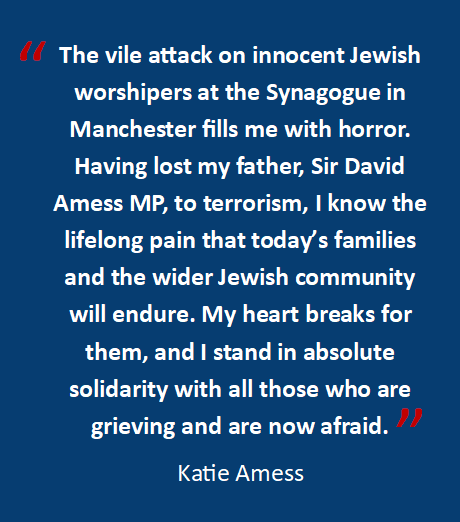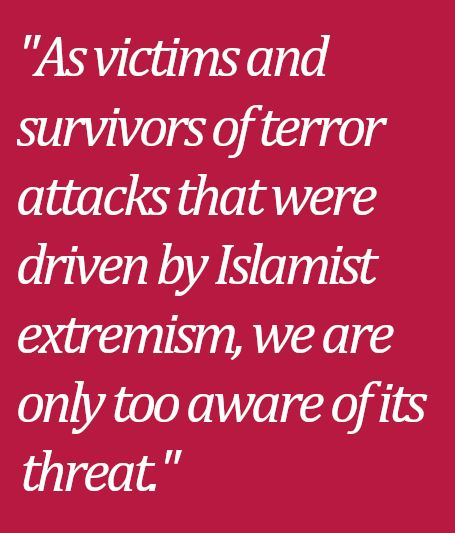Survivors Against Terror

We are a network of survivors of terror attacks
We help families and survivors of terrorism get the rights and the support they deserve
Together we reduce the impact of terror
Survivors social media report finds terror survivors face tsunami of trolling, abuse and harm on social media


This major SAT report finds evidence that in the aftermath of terror attacks, social media presents a profound challenge for survivors – and calls on Ministers, Ofcom, the social media companies and the wider public to do more to ensure that those impacted by terror attacks are protected from the sort of abuse that in many cases already contravenes existing laws, guidelines and policies.
The research finds:
- More than two thirds (67%) of survivors saw social media content about the attack they were involved in; of those, 97% found it harmful or troubling.
- 45% had personal photos and videos taken from social media pages, and 35% found their personal stories used as part of conspiracies – a further, 25% of respondents had their personal photos manipulated on social media.
Over half (52%) of survivors saw their family and/or friends contacted or targeted on social media following attacks, and 41% saw other survivors being targeted. - One in six (17%) had been maliciously sent images of deceased loved ones, messages containing hate speech, accusations of being ‘crisis actors’ involved in conspiracies, and death threats.
These experiences have profound impacts on survivors’ lives – including changes in trust towards others (reported by 93%) and changes in behaviours (reported by 89%). The content survivors were exposed to and the messages they received were traumatic, and often re-traumatising, reminding them of the worst days of their lives. The emotional consequences of this included poor sleep, nightmares, and anger.
The report concludes with a series of recommendations including:
· Government should amend the Online Safety Act to address the standards of social media platforms’ Terms of Service. Specifically, the report recommends the introduction of minimum standards for Terms of Service, as well as a “no rolling back” requirement
· Ofcom is asleep at the wheel and must act much more robustly to enforce all aspects of the Online Safety Act, including on illegal content and protection of children codes. Ofcom must also enforce social media platforms’ duties to adhere to their own Terms of Service, when this comes into force.
· Social media companies must enforce their own rules – taking clear responsibility for the harmful content being posted and shared on their platforms. They should design and implement robust crisis response plans, including well-supported content moderation teams, with dedicated resources to support a more proactive response to tragedies, such as terror attacks. Specifically, footage of terror attacks that has been produced by attackers/terrorist groups must be swiftly identified and removed, while platforms should combat the virality of dangerous material by reducing the algorithmic amplification of harmful and incendiary content.
· The public should report harmful content, refuse to engage with toxic influencers, remember the impact their posts can have on survivors – and use official government, police and other official pages to get useful updates in the immediate aftermath of attacks.
You can read the full report here.
An open letter from survivors calling for unity in the wake of the Manchester synagogue attack

“The vile attack on Jewish worshipers fills us with horror. As people who have been injured, witnessed or bereaved by terror attacks in the past – we know first-hand the immense pain that families will be going through. Our first thoughts as a country must be how we can support those families and their loved ones. We urge the government to immediately activate their support mechanisms and ensure they get all the care they need both now and in the future. We also know from experience that how we respond as a country matters. Terrorists seek to divide our communities.They want us to spread their hatred, to live in fear, and to undermine our collective way of life. Their worst nightmare is that instead of dividing us these attacks pull us closer together.”
You can read the full letter and all signatories here:
Brendan Cox, co-founder of Survivors Against Terror said,
“The reason I think this letter is so powerful is because so many people… are saying with one voice that the best response to it – if you want to help – is to pull together, not to pull apart. And I think that’s a message that will resonate with the public as well.”
The open letter has been published by the Sunday Mirror. You can read the full online Mirror article here
New Media Guidelines for Reporting on Terrorism

Survivors Against Terror has published new guidance for media organisations following a survey that found 59% of them had experienced media intrusion in the aftermath of terror attacks.
The new guidance – which comes just a few days before the 20th anniversary of 7/7 – includes recommendations such as asking journalists:
-
Not to approach bereaved families within the first 48 hours of their loss but to instead direct enquiries via third parties such as the police.
-
To coordinate requests to victims and survivors (rather than them receiving hundreds of different inquiries).
-
To avoid congregating outside a victim’s home.
-
To avoid providing the terrorists the profile they seek and to consider reducing their focus on the names, pictures and manifestoes of terrorists.
Brendan Cox, co-founder of Survivors Against Terror said,
“Media reporting of terror attacks is absolutely in the public interest – what isn’t is intrusion into the lives of victims and survivors. This guidance aims to help journalists strike the balance and we hope media organisations act on it.”
Read the Media Guidelines here.
7/7 In Their Words- 20 Years On
Survivors share stories and raise alarm about failures in mental health support, and the need to fix a broken system.
 A new report from Survivors Against Terror ‘7/7- In Their Words’ sees survivors and bereaved loved ones speak, uninterrupted, about their experiences on the day and in the 20 years since four bombs were detonated on London’s transport system, killing 52 and injuring hundreds more.
A new report from Survivors Against Terror ‘7/7- In Their Words’ sees survivors and bereaved loved ones speak, uninterrupted, about their experiences on the day and in the 20 years since four bombs were detonated on London’s transport system, killing 52 and injuring hundreds more.
The voices in the report tell a painful but vital story. They each experienced different forms of support, gaps, and barriers. But one thread runs through every account – the lack of consistent support when people needed it most.
Top of that list is the failed mental health response- a response that has been inconsistent, under-resourced, and often re-traumatising.It doesn’t have to be this way. On the 20th anniversary of the 7/7 attacks Survivors Against Terror is campaigning to fix this broken system. Drawing on the experience of survivors themselves, we’ve set out a clear Mental Health Policy that demands:
• Immediate psychological triage and support for all
• Long-term, trauma-informed care, not just a few weeks of generic therapy.
• A dedicated point of contact to help survivors navigate services, entitlements and paperwork—especially when grief and trauma make those tasks overwhelming.
• Proper funding and national standards so that support is not based on postcode or persistence.
Beyond mental health, media intrusion and dehumanising compensation systems come up time and again. On media intrusion SAT will shortly publish new guidelines for media organisations which we hope media organisations will use to help reduce the harm that has been inflicted.
On compensation – a much needed review into the broken CICA system seems to have been shelved by the government. We are trying to understand why and what happens next but the status quo cannot be an option.
Martyn's Law finally gets Royal Assent
Proposed legislation aimed at preventing and reducing the harm of terror attacks at events venues has been given Royal Assent.
The Terrorism (Protection of Premises) Bill, known as Martyn’s Law, requires venues with a capacity of 200 or more to have a plan in place in case of an attack on their premises.
Martyn’s mother Figen Murray, who has led the campaign for the new law, is travelling to London for the final stage of the process.
Martyn was among 22 people killed in the 2017 Manchester Arena bombing in May 2017.
Survivors Call for Day of Remembrance to Remember Victims of Terrorism

A new report published by Survivors Against Terror calls for a guarantee of recognition and memorialisation for those affected by terror attacks, as set out in the Survivors’ Charter.
In a survey for the report, 97% of British victims of terrorism stated their support for the introduction of a “National Day” in the United Kingdom, and 78% would like to see a permanent, physical or living memorial to all victims of terrorism.
In particular, Survivors Against Terror are calling for an addition to the system of Royal Honours that would recognise the sacrifice of those injured or bereaved in acts of terrorism, and the creation of a National Day of Remembrance and Tribute to Survivors of Terrorism- and that survivors be part of any decision making process.
Isolate extremists from the Muslim majority who deplore violence

Fifty-eight UK survivors of terrorism have signed a letter condemning Islamist extremism and calling for extremists to be isolated from the vast majority of British Muslims who deplore terrorist violence.
Survivors report: ‘Broken’ terror compensation scheme

Survivors of terror attacks have given a damning verdict on the UK’s terror compensation system in a new report by Survivors Against Terror (SAT) – leading to calls for the system to be replaced.
More than 130 survivors from 11 different terror attacks responded to a SAT survey (conducted by research company Kantar) on the Government’s Criminal Injuries and Compensation Authority (CICA).
A staggeringly low 7% of survivors felt that CICA was sympathetic to their needs, whereas 72% said that they were not.
68% felt that the process was unfair and unreasonable, only 9% felt the opposite. More than half said they were unable to speak to someone from CICA for help